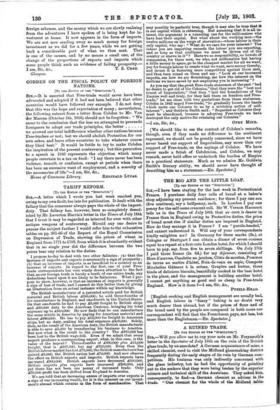TARIFF REFORM.
[To THE EDITOR OP THE " SPECTATOR.1 SIB,—A letter which I wrote you last week reached you, owing to my own fault, too late for publication. It dealt with the fallacy that the consumer always pays the whole of the import- duty. That fallacy has, however, been so completely demol- ished by Mr. Leverton Harris's letter in the Times of July 18th that I trust it may be regarded as interred for ever with other antique weapons of controversy. Should any one desire to pursue the subject further I would refer him to the exhaustive tables on pp. 361-65 of the Report of the Royal Commission on Depression of Trade, showing the prices of wheat in England from 1771 to 1783, from which it is abundantly evident that in no single year did the difference between the two prices bear any relation to the duties.
I propose to-day to deal with two other fallacies : (a) that the increase of imports and exports is necessarily a sign of prosperity ; (b) that an increase of imports is as beneficial to a country as an increase of exports. In regard to the first, one of your Free- trade correspondents has very wisely drawn attention to the fact that, as our foreign trade is barely a tenth of our entire trade, any deductions based upon it are likely to be fallacious. What I pro- pose to show, however, is that an increase of imports is generally a sign of loss of trade, and I cannot do this better than by giving an illustration from an actual instance within my knowledge.
The British manufacturer of a patented article paid for British material and British labour 2385,000; he sold three-fourths of his manufacture in England, and one-fourth in the United States. On that one-fourth he had to pay 25,000 freight to British ships and 220,000 duty to the American Customs, bringing his total expenses up to 2410,000. He now finds that he can manufacture the same article in America by paying for American material and labour .2390,000. He has to pay 415,000 for freight to American ships, but no duty, making his total expenses £405,000. Solely, then, as the result of the American duty, the British manufacturer is able to save £5,000 by transferring his business to America. But now what is the result to the country ? The £385,000 has been lost to the British wage-bill. Even if we admit that every import produces a corresponding export, what, in this case, is the value of the import ? Three-fourths of 2390,000 plus £15,000 freight, that is £307,500, but say 2310,000. Even then the British labour market has lost £75,000, the British manufacturer has gained 25,000, the British nation lost £70,000. And now observe the effect on British exports and imports. British imports have inc'.easod £300,000. British exports have decreased 2100,000. British imports plus exports have increased £200,000, and yet there has not been one penny of increased trade. Only 270,000 profit has been shifted from England to America.
We are told that an increasing excess of imports over exports is a sign of our increasing wealth, for it is the interest on our invest- ments abroad which returns in the form of merchandise. That may possibly be perfectly true, though it may also be true that it is our capital which is returning. But assuming that it is all in- terest, the argument is a consoling one for the millionaires who have lent their capital. But what about the working men—the twelve millions on the verge of starvation—whose labour is their only capital, who say : " What do we care for your interest ? The labour you are importing exceeds the labour you are exporting, and so long as that continues we must be driven out of the country or starve in it" ? Have we no responsibility, no bowels of compassion, for these men, we who, not millionaires but having a little money to spare, go to the cheapest market for all we want, pay for foreign labour to create what we want, save money thereby, and invest it in fostering more competition against these men, and then turn round on them and say : " Look at our increased imports, see how we are flourishing, see how the interest on the millions we have saved by not employing you is increasing " ?
As you say that the great Free-trade statesmen of the past " had no desire to get rid of the Colonies," that they were the "best and truest of Imperialists," that they " laid the foundations of the Empire well and truly, for they laid them on freedom and Free- trade," let me close with two quotations from these statesmen. Cobden in 1842 urged Free-trade, "to gradually loosen the bands which unite our Colonies to us by a mistaken notion of self- interest" ; and Goldwin Smith said : "Regarded as Colonies they must be abandoned, because in adopting Free-trade we have destroyed the only motive for retaining our Colonies."
We should like to see the context of Cobden's remarks, though, even if they made no difference to the sentiment expressed, we should not be greatly concerned, since we have never based our support of Imperialism, any more than our support of Free-trade, on the sayings of Cobden. We have never made a fetish of Cobdenism, and Cobden, we may remark, never held office or undertook the burden of Empire as a practical statesman. Much as we admire Mr. Goldwin Smith's literary ability, we should never have thought of describing 'aim as a statesman.—ED. Spectator.]






































 Previous page
Previous page